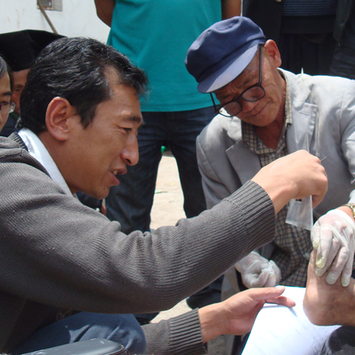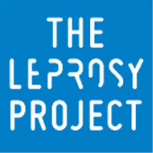
Jidi was born in 1972 in Butou village, one of the leprosy rehabilitation villages in Sichuan province. He is the oldest of five, with two younger brothers and two younger sisters. His father was a barefoot doctor, and his mother a farmer. He attended the Temuli primary school in Butou town, a 40 minute walk along a mountain road. In the early 1980s, he and his family moved out of Butou village. In 1996, due to insufficient farmland outside of the village, forced them to move back to Butou village. Jidi spent most of his childhood taking care of his family’s goats, but would play jacks whenever he had a free moment.
Jidi and his family tried again to leave Butou Village, to return to his parents’ home village. Because his father was a leprosy patient, they fell victim to discrimination. Although he showed no visible deformities, the village was small and word spread quickly about their past. As a result, they were forced to move back to Butou village.
Before Jidi’s father was diagnosed with leprosy at the age of 18, he had high status in the village; almost everybody knew him. Therefore, his diagnosis was not kept secret for long. Jidi’s maternal grandparents were both leprosy patients, so Jidi’s mother was very knowledgeable about the disease. The fact that her future husband had leprosy didn’t bother her and she went ahead with the marriage.
After Jidi finished school at the age of 14, his parents arranged his marriage in accordance with Yi tradition. Jidi remembers the ceremony as being fun because they got to eat a lot of good food. During the ceremony, he wore new clothes while his bride wore a traditional Yi gown. If the couple is under 18, it is Yi tradition for the bride to go to the groom’s house for a banquet on their wedding night and return home the following morning after breakfast. Jidi paid a 2000 RMB dowry for his wife.
When Jidi and his wife finally moved in together, seven years after the ceremony. They were both embarrassed. In accordance with Yi tradition they slept in the same room but in separate beds. Their first child was born when Jidi was 24 years old. They had three more children in the years that followed.
In 1996 when he and his family moved back to Butou, he helped his father as a barefoot doctor, which began his exposure to health care work. He worked in health care in Butou village in 2006 and was hired by the Leprosy Project in 2007.
Today, Jidi works as the Assistant Manager of The Leprosy Project coordinating with villagers and health care workers. Jidi says that the best part about working for the Leprosy Project is rehabilitating people. The Leprosy Project’s achievements in the treatment of leprosy patients make him happy and proud. The favorite part of his job with The Project is Community Development and Prevention of Disease. He believes that through community development, the villages will improve their living standards, resulting in better health standards which will aid their efforts in disease prevention.
Although The Leprosy Project has been successful in their efforts to prevent disease and further disability, Jidi is frustrated that the people affected by leprosy have yet to see a significant change in their standard of living. They are eating the same foods they were eating 10 years ago, and their hygiene is still poor. The most difficult part of the Leprosy Project’s work is dealing with hygiene and education. People have been living in these rehabilitation villages for a very long time and it is therefore extremely difficult to change their habits. This is particularly frustrating for Jidi as a community worker. After health care providers clean the patients’ wounds and ulcers, they get dirty again when the patient returns home due to lack of hygiene in their dwellings. The dirt often harbors bacteria and germs, meaning the ulcers and wounds get re-infected very easily. Furthermore, the villagers’ diets lack nutrition – most villagers will have potato soup for almost every meal – which directly affects the healing of the ulcers and wounds.
edited by Georgie Reading
Jidi and his family tried again to leave Butou Village, to return to his parents’ home village. Because his father was a leprosy patient, they fell victim to discrimination. Although he showed no visible deformities, the village was small and word spread quickly about their past. As a result, they were forced to move back to Butou village.
Before Jidi’s father was diagnosed with leprosy at the age of 18, he had high status in the village; almost everybody knew him. Therefore, his diagnosis was not kept secret for long. Jidi’s maternal grandparents were both leprosy patients, so Jidi’s mother was very knowledgeable about the disease. The fact that her future husband had leprosy didn’t bother her and she went ahead with the marriage.
After Jidi finished school at the age of 14, his parents arranged his marriage in accordance with Yi tradition. Jidi remembers the ceremony as being fun because they got to eat a lot of good food. During the ceremony, he wore new clothes while his bride wore a traditional Yi gown. If the couple is under 18, it is Yi tradition for the bride to go to the groom’s house for a banquet on their wedding night and return home the following morning after breakfast. Jidi paid a 2000 RMB dowry for his wife.
When Jidi and his wife finally moved in together, seven years after the ceremony. They were both embarrassed. In accordance with Yi tradition they slept in the same room but in separate beds. Their first child was born when Jidi was 24 years old. They had three more children in the years that followed.
In 1996 when he and his family moved back to Butou, he helped his father as a barefoot doctor, which began his exposure to health care work. He worked in health care in Butou village in 2006 and was hired by the Leprosy Project in 2007.
Today, Jidi works as the Assistant Manager of The Leprosy Project coordinating with villagers and health care workers. Jidi says that the best part about working for the Leprosy Project is rehabilitating people. The Leprosy Project’s achievements in the treatment of leprosy patients make him happy and proud. The favorite part of his job with The Project is Community Development and Prevention of Disease. He believes that through community development, the villages will improve their living standards, resulting in better health standards which will aid their efforts in disease prevention.
Although The Leprosy Project has been successful in their efforts to prevent disease and further disability, Jidi is frustrated that the people affected by leprosy have yet to see a significant change in their standard of living. They are eating the same foods they were eating 10 years ago, and their hygiene is still poor. The most difficult part of the Leprosy Project’s work is dealing with hygiene and education. People have been living in these rehabilitation villages for a very long time and it is therefore extremely difficult to change their habits. This is particularly frustrating for Jidi as a community worker. After health care providers clean the patients’ wounds and ulcers, they get dirty again when the patient returns home due to lack of hygiene in their dwellings. The dirt often harbors bacteria and germs, meaning the ulcers and wounds get re-infected very easily. Furthermore, the villagers’ diets lack nutrition – most villagers will have potato soup for almost every meal – which directly affects the healing of the ulcers and wounds.
edited by Georgie Reading

 RSS Feed
RSS Feed
